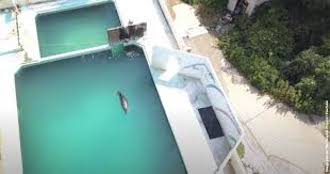Honey the Dolphin
This is Honey, whose tragic life ended earlier this year. She is pictured here in the facility where she was held captive. You don’t see any others of her kind in this image, but it wouldn’t matter if you zoomed out to see the entire tank – there were no others to be seen.
The facts of her case are simple, but their implications are not. I want us to consider the state of the world as we’ve made it, here in the present day. This is a case that forces us to look in the mirror, and to seriously think about how we want to relate to the rest of the natural world. Who are we? And is this who we want to be?
Honey, a female bottlenose dolphin, lost her freedom when she was captured in Taiji’s infamously cruel hunts in 2005. Since that date, she never again was to experience life in the open sea, surrounded by other members of her pod, with which dolphins share intense personal bonds. Honey is the name humans gave her, of course. To the others of her pod she would have had an entirely different name, a unique signature whistle dolphins use to identify and address one another.
What happened to the rest of her pod? Well being of her particular species it’s likely that others were also taken for a life in captivity, to be dispersed to aquaria all over the globe, severing their social bonds forever. Others, incredibly, may have been slaughtered for their meat, which is routinely done in these hunts. From Honey’s perspective, she would never know what happened to these other individuals she would have thought of as family.
Then, two years ago, her case became especially egregious and heartbreaking, and the media would soon brand her “the world’s loneliest dolphin”. She (along with 46 penguins and hundreds of fish and reptiles) were kept in captivity at the Inubosaki Marine Park Aquarium, which is in the city Choshi, just east of Tokyo. This facility was closed in January of 2018. Arrangements were made for the animals to be fed by employees, but they were otherwise left alone – essentially abandoned. PETA described the conditions at this facility as “’increasingly miserable and life-threatening”.
Now let’s stop and consider the implications of this for a moment. If those were the prevailing conditions for penguins, fish and reptiles – what could this possibly have been like for a dolphin? Remember that Honey’s brain was as large and complex as yours, and her need for social interaction was every bit as sophisticated as yours. In the wild she would swim enormous distances with her pod, hunting, playing and exploring together. Her life now was to be spent floating listlessly or swimming in endless circuits of a featureless concrete tank.
Try to put yourself in her place, and imagine the despair she would have been feeling throughout this time.
She died alone, having never again experienced the company of another of her species for the last two years of her life.
So here’s the take away from this. We owe it to ourselves to reflect on her death, an event which finally put an end to the awful circumstances of her life, as a benchmark. One where we should take stock of where we are – as stewards of the rest of the natural world in the year 2020. And the fact is that we, humanity in the aggregate, are OK with this.
Many of us are outraged, of course, and will continue to fight to put an end to the outrageous and immoral practice of dolphin captivity. We will continue to fight for an end to dolphin drive hunts, like those in Taiji, for as long as it takes. Enormous effort and resources were poured into the attempt to secure Honey’s release – to liberate her from this hell-on-Earth that had become her life. A great many people cared very deeply about her, and will continue to care about others of her kind. This fight has a long way to go, and we are thoroughly committed to it.
But here’s the thing. Change comes about when sufficient numbers of people have spoken up, and done so forcefully enough, that politicians become afraid not to act. Or the enormous profits to be made from cetacean captivity by the entertainment industry start to dry up, and the business model becomes untenable.
We’ve made enormous progress. A handful of countries have now banned captivity. Most large travel companies will no longer book tickets to such shows, and some cruise lines no longer make stops in the Faroe Islands. And there’s no question that SeaWorld is in trouble financially, COVID or not.
But remember this. When you take the cumulative results of all our efforts to date, all our donations, and our voices and our research, our volunteer hours and our legal battles – an insufficient number of Japan’s politicians feel it prudent to move against the fact that what happened to Honey is perfectly legal under Japanese law. As it is in most countries of the world. And though a few nations have banned whale and dolphin captivity, only one country in the world so far – one! (India) – has taken the morally necessary step of recognizing personhood rights for dolphins.
The series of events that took place in this case should not have been possible, and one day won’t be possible, and I hope to live long enough to see that day.
For The Orca’s Voice,
Anna, Canadian Cetacean Alliance



Leave a Reply